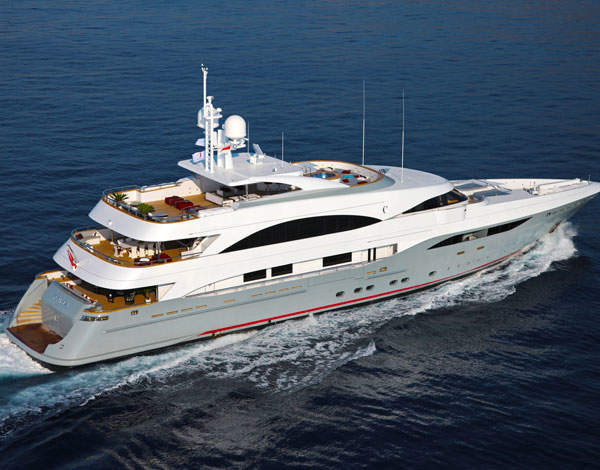

At Marina Port Vell, the new superyacht marina in the heart of Barcelona, Salamanca Group launched their series of private client round-tables in style. The inaugural event brought together lawyers, accountants, finance brokers and experts in the yacht industry from London, Jersey, Geneva and Barcelona to discuss current trends in the superyacht industry and the challenges faced by private clients when entering this market.
After an uncertain few years, the good news for those in the superyacht world is that orders for new builds are now steadily increasing, with the market expecting a record number of new 70m+ yachts to be ordered over the next few years and values across the size-range continuing to climb.
Norma Trease, Head of Salamanca Marine, was buoyed by this as she commented to those attending that in her experience this health at the top of the food chain had a significant trickle-down trickles down to others in the market, stimulating sales and acquisitions as well as the spend on associated elements from refurbishing and crewing the yachts through to insuring and berthing them.
Norma’s comments are backed up by some impressive statistics. According to a report, luxury yachts top the list of the 10 most expensive asset purchases ever recorded and eight out of the 10 billionaires on this list own these luxury vessels. Given these facts and the more general allure of this asset class, it therefore comes as something of a surprise that only 3 per cent of those high net worth individuals able to afford such a purchase actually go on to acquire a superyacht.
It was this observation that framed the day’s discussions as those assembled sought to understand what challenges and issues clients were facing to put them off this market and what potential solutions there might be.
Seafarers’ Bill of Rights
The first area causing waves was the new Maritime Labour Convention (MLC), also known as the Seafarers’ Bill of Rights. This introduces minimum standards across the industry ranging from the size of crew quarters and their working hours through to the health and safely qualifications of the on-board chefs.
While nobody denied that the MLC brought some much-needed protection for those working in the industry, the practical implications were unprecedented and many seemed to go much further than necessary to address the perceived concerns, especially when the fishing industry with undisputedly harsher conditions was carved out of the legislation.
Anouch Sedef of Meyer Avocats in Geneva explained that she has been busy drafting and reviewing crew agreements and employment contracts but that, despite this, she thought that many yacht owners were still unaware that the MLC was already in force. As the owners were ultimately answerable to port state authorities for compliance the expectation among attendees was that detailed inspections and potential detentions would increase further over the busy summer months.
A tax sting in the tail
Another aspect the group noted as deterring potential clients from acquiring yachts was the marked increase in interest being shown in yachts and their owners following the financial crisis as tax authorities sought to swell their coffers.
Those able to afford a yacht made not only easy targets but also ones that would draw little sympathy from the wider public. There were plenty of stories of uniformed officers of Italy’s Guardia di Finanza boarding boats and performing on-the-spot checks, impounding them where necessary and there and increased boardings from port authorities elsewhere in the Mediterranean.
While nobody is trying to defend tax evaders, the approach of authorities in some locations has been described by some as obsessive, boarding the same boats on numerous occasions.
The rules around what taxes should be paid are complex and, with the potential threat of the yacht being impounded as well as significant fines and charges, this is certainly a situation where ignorance does not equate to bliss.
As Nic Arnold, head of the private client superyacht and aviation practice at PwC, commented, the rules on temporary admission and its application to charter yachts and different flags change frequently and are often misunderstood, even by some working within the business. This makes the VAT aspects a particular hot-spot for inadvertent transgressions, especially where reliance was placed on the fact the yacht was somehow related to the owner’s business. This is therefore a critical area for all clients to get proper advice on.
Sale process and structuring
Another challenge highlighted by Esteban Raventós, a partner of Baker & McKenzie’s Barcelona office, was structuring the purchase of a yacht or even simply its berth. Should they own it directly, use a holding company or perhaps even a trust or foundation? The stages and processes can seem overwhelming to the uninitiated and there is no one-size-fits-all solution.
The best approach for a specific client will depend upon factors such as their country of residence, the yacht’s size, value, flag state and intended use among many other things. It frequently required legal and tax advice in multiple jurisdictions and, once the client has the advice, the story does not end there. As Esteban noted, the devil is in the detail and the implementation. Clearly in each instance, choosing partners to work with who have experience will save the clients time and money in the end.
Proceeding to the checkout
Finally, as is so often the case, the discussions turned to financing the purchase. Bob Atkinson of B Capital made the observation that he rarely saw clients soon enough in the process. Choices such as the yacht builder or the degree of personal specification could have just as much impact on the ability to obtain finance as the size of the yacht and the price being paid and key decisions were often made long before advice on finance was sought.
The others around the table agreed that they frequently saw similar problems, with clients reluctant to engage advisers and incur fees early on in the process, something that often ending up costing them more in the long-run.
At the end of the afternoon, the group were left with food for thought and the overriding conclusion that the industry needed to start sharing more experiences and best practice and, in doing so, start to make things more transparent and raise the bar.
Superyachts are meant to be a luxury lifestyle asset; the degree of complexity, uncertainty and lack of transparency that often surrounds them can be enough to put all but the most determined off this already expensive hobby.






